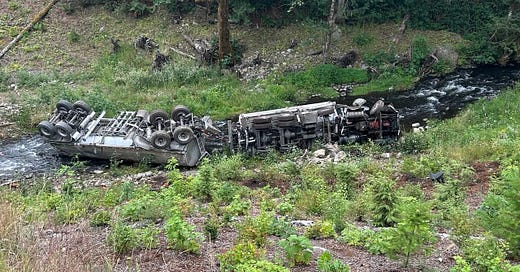[UPDATED] Elwha River Disaster as Petroleum Tanker Falls 300' into Indian Creek. Port Angeles has 24 hours of Drinking Water.
40+ Years and 335 Million Dollars River Restoration Activities Further Jeopardized.
SEE SEATTLE TIMES UPDATE BY CONRAD SWANSON AND ISABELLA BREDA here
FROM THE WASHINGTON STATE DEPT. OF ECOLOGY 7/19 1:17 pm.
As of 5 a.m., the overturned tanker truck has been successfully lifted and removed from Indian Creek and Highway 101 is now open.
Crews are continuing to confirm the total volume of fuel released into the water. Preliminary estimates indicate 3,000 gallons of a mixture of gasoline and diesel, with the majority being gasoline, spilled into Indian Creek.
Air monitoring readings were not at a level above human health and safety at this time, but people in the area should still be mindful of symptoms like headaches, or dizziness and see medical attention if needed.
The Lower Elwha Klallam Tribe will conduct shoreline assessments today to monitor for environmental impacts. The Department of Health is also collecting water samples for further analysis.
Containment and recovery efforts remain underway, with crews continuing to actively manage the release and protect downstream resources.
Natural Resources and Fisheries technician Vanessa Castle put it simply on Facebook this morning, posting, “Pray for the Elwha, This is our worst nightmare.”
Castle is employed by the Lower Elwha Tribe and monitors the health and effectiveness of the river restoration efforts on this once super-productive salmon river, pouring out of the Olympic Mountains west of Seattle.
Recent hypocrisies related to the approval of logging contracts at areas within the Elwha watershed by the Department of Natural Resources of the state of Washington, under the administration of Dave Upthegrove, called into question the commitments made by the state agency to pause logging of mature complex forests. These forests act as a bulwark against climate change, and an ecological nursery, spawning wide ranging biodiversity in light of loss of species and mass extinctions worldwide.
And now, a petroleum truck driver fails to navigate a turn on Highway 101 and plunges off the highway into the Elwha tributary at Indian Creek. According to the Peninsula Daily News, “The State Patrol said the cause was improper lane usage and added (driver) Schaw was cited for second-degree negligent driving.
The tanker was leaking petroleum and the state Department of Ecology had been notified.”
Once the producer of the largest Chinook salmon in the lower 48, known as the Elwha Kings, and home to the largest runs of a variety of salmon stocks as a whole, the river was dammed in 1910. Then, after a “washout,” the Lower Elwha Dam was completed in 1913 at river mile 4.9. The dam blocked migrating salmon to the upper 38 miles (48 km) of mainstream habitat and more than 30 miles (48 km) of tributary habitat.
The salmon runs that once numbered more than 400,000 adult returns in over 70 miles (110 km) of available habitat, after construction numbered less than 4,000 adult returns on only 4.9 miles (7.9 km) of available habitat.
The construction of the dam and implementation of laws prohibiting Indians from fishing in their usual and accustomed grounds, despite a treaty to the contrary, deprived indigenous populations from harvesting their traditional foods, a genocidal act, contravening the United Nations Declaration on the Rights of Indigenous Peoples.
Now a petroleum tanker landing upside down in Elwha tributary, Indian Creek, is the latest assault on Native lifeways.
It is also an assault on the increasingly diverse community of Port Angeles, as this latest incident has compromised the drinking water supply to the town. At the time of this writing, Port Angeles has potable drinking water remaining for only 24 hours and water conservation has been mandated.
The Elwha River Fisheries and Ecosystem Restoration Act of 1992 mandated removal of the river’s then two dams and restoration of the ecosystem there to a natural state.
Over 335 million dollars has been invested and tribal members are finally once again permitted to participate in a limited subsistence fishery, as runs of Chinook, Coho, Pink, Chum and Steelhead have begun to make a notable comeback.
Despite the efforts of many, alongside the persistent work of the tribal community to resist encroachment, destruction, and attacks on sovereignty for over 100 years, unforced errors, malfeasance, abuse, and lack of education and oversight, continue to plague the town, contributing to bad practices, racism, and violence, born from raging drug and alcohol problems in the community, and make Port Angeles its own worst enemy, depriving the town of reaching its long sought after potential.
###





